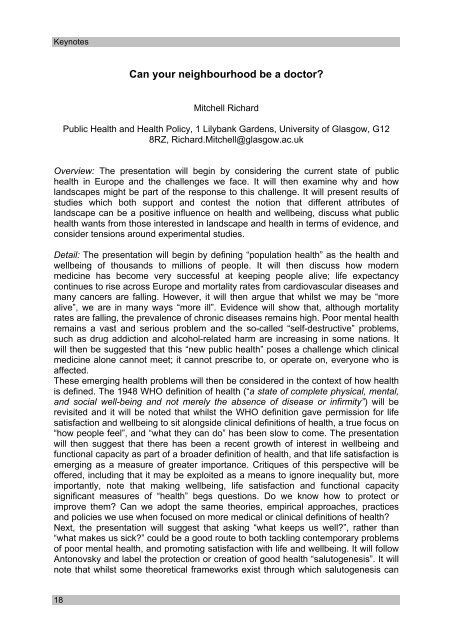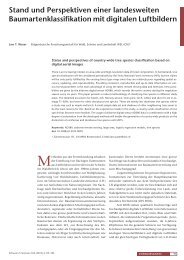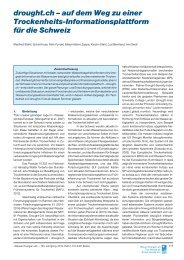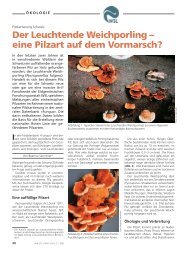Landscape and Health: Effects, Potential and Strategies ... - WSL
Landscape and Health: Effects, Potential and Strategies ... - WSL
Landscape and Health: Effects, Potential and Strategies ... - WSL
Sie wollen auch ein ePaper? Erhöhen Sie die Reichweite Ihrer Titel.
YUMPU macht aus Druck-PDFs automatisch weboptimierte ePaper, die Google liebt.
Keynotes<br />
18<br />
Can your neighbourhood be a doctor?<br />
Mitchell Richard<br />
Public <strong>Health</strong> <strong>and</strong> <strong>Health</strong> Policy, 1 Lilybank Gardens, University of Glasgow, G12<br />
8RZ, Richard.Mitchell@glasgow.ac.uk<br />
Overview: The presentation will begin by considering the current state of public<br />
health in Europe <strong>and</strong> the challenges we face. It will then examine why <strong>and</strong> how<br />
l<strong>and</strong>scapes might be part of the response to this challenge. It will present results of<br />
studies which both support <strong>and</strong> contest the notion that different attributes of<br />
l<strong>and</strong>scape can be a positive influence on health <strong>and</strong> wellbeing, discuss what public<br />
health wants from those interested in l<strong>and</strong>scape <strong>and</strong> health in terms of evidence, <strong>and</strong><br />
consider tensions around experimental studies.<br />
Detail: The presentation will begin by defining “population health” as the health <strong>and</strong><br />
wellbeing of thous<strong>and</strong>s to millions of people. It will then discuss how modern<br />
medicine has become very successful at keeping people alive; life expectancy<br />
continues to rise across Europe <strong>and</strong> mortality rates from cardiovascular diseases <strong>and</strong><br />
many cancers are falling. However, it will then argue that whilst we may be “more<br />
alive”, we are in many ways “more ill”. Evidence will show that, although mortality<br />
rates are falling, the prevalence of chronic diseases remains high. Poor mental health<br />
remains a vast <strong>and</strong> serious problem <strong>and</strong> the so-called “self-destructive” problems,<br />
such as drug addiction <strong>and</strong> alcohol-related harm are increasing in some nations. It<br />
will then be suggested that this “new public health” poses a challenge which clinical<br />
medicine alone cannot meet; it cannot prescribe to, or operate on, everyone who is<br />
affected.<br />
These emerging health problems will then be considered in the context of how health<br />
is defined. The 1948 WHO definition of health (“a state of complete physical, mental,<br />
<strong>and</strong> social well-being <strong>and</strong> not merely the absence of disease or infirmity”) will be<br />
revisited <strong>and</strong> it will be noted that whilst the WHO definition gave permission for life<br />
satisfaction <strong>and</strong> wellbeing to sit alongside clinical definitions of health, a true focus on<br />
“how people feel”, <strong>and</strong> “what they can do” has been slow to come. The presentation<br />
will then suggest that there has been a recent growth of interest in wellbeing <strong>and</strong><br />
functional capacity as part of a broader definition of health, <strong>and</strong> that life satisfaction is<br />
emerging as a measure of greater importance. Critiques of this perspective will be<br />
offered, including that it may be exploited as a means to ignore inequality but, more<br />
importantly, note that making wellbeing, life satisfaction <strong>and</strong> functional capacity<br />
significant measures of “health” begs questions. Do we know how to protect or<br />
improve them? Can we adopt the same theories, empirical approaches, practices<br />
<strong>and</strong> policies we use when focused on more medical or clinical definitions of health?<br />
Next, the presentation will suggest that asking “what keeps us well?”, rather than<br />
“what makes us sick?” could be a good route to both tackling contemporary problems<br />
of poor mental health, <strong>and</strong> promoting satisfaction with life <strong>and</strong> wellbeing. It will follow<br />
Antonovsky <strong>and</strong> label the protection or creation of good health “salutogenesis”. It will<br />
note that whilst some theoretical frameworks exist through which salutogenesis can

















